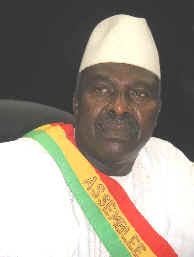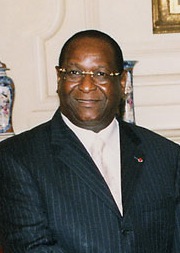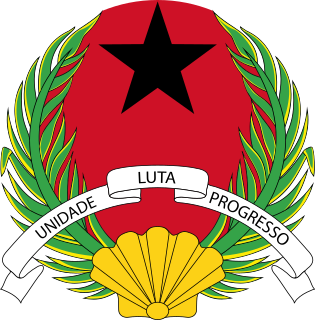Related Research Articles

Politics of Guinea takes place in a framework of a presidential representative democratic republic, whereby the President of Guinea is both head of state and head of government of Guinea. Executive power is exercised by the government. Legislative power is vested in both the government and the National Assembly.

The Republic of Guinea Armed Forces are the armed forces of Guinea. They are responsible for the territorial security of Guinea's border and the defence of the country against external attack and aggression.

Conakry is the capital and largest city of Guinea. A port city, it serves as the economic, financial and cultural centre of Guinea. Its population as of the 2014 Guinea census was 1,660,973.

Lansana Conté was a Guinean politician and military official who served as the second President of Guinea, from 3 April 1984 until his death on 22 December 2008. Conté came to power in the 1984 Guinean coup d'état.

Cellou Dalein Diallo is a Guinean economist and politician who was Prime Minister of Guinea from 2004 to 2006. Previously he held a succession of ministerial posts in the government from 1996 to 2004. Currently he is President of the Union of Democratic Forces of Guinea (UFDG), an opposition party. He was a candidate in the 2020 Guinean presidential election but lost to incumbent Alpha Condé.

Sidya Touré is a Guinean politician. He was Prime Minister of Guinea from 1996 to 1999 and is currently the President of the Union of Republican Forces (UFR), an opposition party.

El Hajj Aboubacar Somparé was a Guinean politician who was President of the National Assembly of Guinea from 2002 to 2008. He was previously Guinea's Ambassador to France from 1978 to 1984 and was Secretary-General of the Unity and Progress Party (PUP) from 1995 to 2002.

Lansana Kouyaté is a Guinean politician and diplomat who served as Prime Minister of Guinea from 2007 to 2008. Previously he was Executive Secretary of the Economic Community of West African States (ECOWAS) from 1997 to 2002.

The 2007 Guinean general strike began on January 10, 2007. Guinea's trade unions and opposition parties called on President Lansana Conté to resign, accusing him of mismanaging the economy and abusing his authority. The strikers also accused Conté of personally securing the release of Mamadou Sylla and Fodé Soumah, both accused of corruption, from prison. The strike ended on January 27 with an agreement between Conté and the unions, according to which Conté would appoint a new prime minister; however, Conté's choice of Eugène Camara as prime minister was deemed unacceptable by the unions, and the strike resumed on February 12. Martial law was imposed on the same day. Nearly two weeks later, Conté agreed to choose a prime minister acceptable to the unions, and on February 26 he named Lansana Kouyaté as prime minister. The strike ended on February 27, and Kouyaté was sworn in on March 1.
Mamadou Sylla is a Guinean politician and business leader.
Eugène Camara was a politician from Guinea who was briefly Prime Minister of Guinea in February 2007.

Parliamentary elections were held in Guinea-Bissau on 16 November 2008. The result was a victory for the African Party for the Independence of Guinea and Cape Verde (PAIGC), which won 67 out of the 100 seats in the National People's Assembly, while the Party for Social Renewal (PRS) won 28 seats.
Ahmed Tidiane Souaré is a Guinean political figure who was the Prime Minister of Guinea from May 2008 to December 2008, when he was replaced by Kabine Komara following a military coup d'état.

The 2008 Guinean coup d'état occurred in Guinea on 23 December 2008, shortly after the death of long-time President Lansana Conté. A junta called the National Council for Democracy and Development, headed by Captain Moussa Dadis Camara, seized power and announced that it planned to rule the country for two years prior to a new presidential election. Camara did indeed step down after Alpha Condé was elected in the 2010 election.

Captain Moussa Dadis Camara, now called Moïse Dadis Camara, is an ex-officer of the Guinean army who served as the President of Guinea from 23 December 2008 to 15 January 2010. He was the leader of the National Council for Democracy and Development, which seized power in a military coup d'état on 23 December 2008 shortly after the death of long-time president Lansana Conté.

Kabiné Komara was Prime Minister of Guinea from 30 December 2008 to 26 January 2010. Until the end of 2008 a director at the African Export-Import Bank in Cairo, Egypt, Komara was announced as the new Prime Minister in a government radio broadcast on 30 December.
Jean-Marie Doré was a Guinean politician who was the Prime Minister of Guinea from January 2010 until December 2010. Doré, who was the President of the Union for the Progress of Guinea (UPG), was an opposition leader for years before being chosen to head a transitional government that was in place during the preparation and conduct of the 2010 presidential election.
The Donka Hospital is a publicly owned hospital in Conakry, Guinea. It has inadequate facilities to handle demand, and many Guineans cannot afford its services. More than once in recent years the hospital has had to deal with a major influx of patients wounded in civil disturbances.
There were two waves of violence in Guinea in 2013, first in February and March, then in July.

On 5 September 2021, President of Guinea Alpha Condé was captured by the country's armed forces in a coup d'état after gunfire in the capital, Conakry. Special forces commander Mamady Doumbouya released a broadcast on state television announcing the dissolution of the constitution and government.
References
- ↑ James Butty, "Guinea's Consensus Prime Minister Sacked" Archived 2012-05-25 at archive.today , VOA News, May 20, 2008.
- ↑ "Guinea's president fires prime minister" Archived 2009-01-24 at the Wayback Machine , Associated Press (International Herald Tribune), May 21, 2008.
- 1 2 3 "Angry soldiers embark on rampage in Guinea", Sapa-AFP (IOL), May 28, 2008.
- ↑ "Shooting rocks Guinean capital, causing panic" [ permanent dead link ], African Press Agency, May 26, 2008.
- 1 2 3 4 5 6 "Guinea premier agrees to pay soldiers", Sapa-DPA (IOL), May 27, 2008.
- 1 2 3 "Soldats en colère en Guinée: 1 mort, 8 blessés, le ministre de la Défense limogé", AFP (Jeuneafrique.com), May 27, 2008 (in French).
- 1 2 "Guinea soldiers call for sacking of top brass", AFP (IOL), May 29, 2008.
- 1 2 3 4 "Guinée: le Premier ministre lance un appel au calme", AFP (Jeuneafrique.com), May 27, 2008 (in French).
- 1 2 "Guinean govt meets demands of restive soldiers" [ permanent dead link ], African Press Agency, May 28, 2008.
- ↑ "Conakry airport closed following raid by Guinean mutineers" [ permanent dead link ], African Press Agency, May 29, 2008.
- ↑ "2 presidential guards seriously injured in Conakry gunfire exchange" [ permanent dead link ], African Press Agency, May 29, 2008.
- ↑ "Three die in mutiny by Guinean soldiers" [ permanent dead link ], African Press Agency, May 29, 2008.
- ↑ "Manifestation de soutien au Président Conté à Conakry" [ permanent dead link ], African Press Agency, May 30, 2008 (in French).
- 1 2 "Guinée: situation apaisée, début du paiement de primes aux soldats mutins", AFP (Jeuneafrique.com), May 31, 2008 (in French).
- 1 2 3 4 "Conakry regains calm as mutinying soldiers get salary arrears" [ permanent dead link ], African Press Agency, May 30, 2008.
- 1 2 "Conakry, upcountry regain calm following mutiny" [ permanent dead link ], African Press Agency, June 1, 2008.
- ↑ "La société civile guinéenne condamne les violences faites aux civils lors de la mutinerie" [ permanent dead link ], African Press Agency, May 31, 2008 (in French).
- ↑ "Le président Conté promet d’examiner avec sérieux les revendications des mutins" [ permanent dead link ], African Press Agency, June 1, 2008 (in French).
- 1 2 "Guinée: le président promet aux soldats mutins d'examiner leurs revendications", AFP (Jeuneafrique.com), June 1, 2008 (in French).
- 1 2 3 "GUINEA: Police strikes turn bloody", IRIN, June 17, 2008.
- 1 2 3 4 5 "Three die in shooting between police, soldiers in Guinea" [ permanent dead link ], African Press Agency, June 17, 2008.